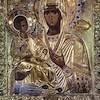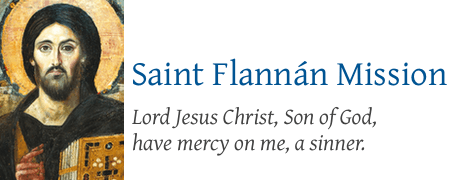 In the Name of the Father and of the Son and of the Holy Spirit, one God. Amen. Dear beloved, let us remember the Venerable Paul and physician from Corinth, and our beloved Most Holy Theotokos, today.
In the Name of the Father and of the Son and of the Holy Spirit, one God. Amen. Dear beloved, let us remember the Venerable Paul and physician from Corinth, and our beloved Most Holy Theotokos, today.
Father among the saints, St John of Damascus, was a great defender of Icons and Orthodoxy, was a monk in the 8th century. Because of his belief, he was slandered by the iconoclast emperor Leo III to the Damascus caliph, who cut off the right hand of the saint. The saint begged before an icon of our Theotokos to be healed. After a long prayer, the saint fell asleep. In his dream, our Most Holy Mother assured him of healing, and the saint woke and saw his right hand without damage. The monk fashioned a silver hand and attached it to the icon of the Theotokos, and thereafter, this icon was known as Troeruchitsa (3 hands). Our beloved Most Holy Theotokos, Mother of God, intercede for us sinners.
The Venerable Paul the physician, from the city in Corinth, became an ascetic monk in his youth. The saint was maligned by a woman carrying an infant saying that the child was his. The saint took in the infant with humility and silence, and endured the painful and hurtful slander thrown at him. When the uproar became uncontrollable, St Paul pronounced to the crowd that perhaps the baby could enlighten all of them to who the real father was. Miraculously, through the Mercy of God, the baby pointed to the blacksmith and said, “this is my father, and not the monk.” Everyone bowed to the saint and asked for his forgiveness. The saint was then gifted by God to heal the sick, thus called the Physician. The saint reposed in his seventies. Venerable Paul of Corinth, pray for us!
When we think of the world today, there is something wounded and painful about it. The world is wounded and hurting, and the inhabitants, whether fauna or flora, or mankind, all wounded and hurting at the same time. There is an increase in mental pains, depression, and sometimes even fatal obsessions, that aggravate and multiply the pains and hurts people go through, and invariably, intensify even more pain all around. We begin to see people hurting or even killing others, belying the very hurt they themselves are woefully experiencing deep within.
There are two paths out of this. Do we oblige or succumb to the pains and hurts of the world, and give up altogether? Or do we fight against these pains and hurts with what we can summon from the lofty heights of footsteps of saints who followed Christ have done before us?
Yes, as Christians, we are soldiers, and we fight tooth and nail to the very end, defending our spiritual journeys against the lures of the evil one, with repentance and prayers unto God. We are soldiers who are called by the commandments we abide, as covenants with our beloved God, to defend the weak and to pull them out of their wounds and hurts, with nothing short of compassion and hope in our Lord.
We do not carry swords of hurt, but we carry swords of selfless prayers together with the intercessions of the holy saints. We do not carry shields of anonymity, but we carry shields of God’s Truth as our illumination to the paths before us, lighting up our journeys in deeds of service for others, as street lights that illumine the Gospel message in a manner that does not intimidate, but to serve (St Matthew 10:23-31).
We as Christians, are not super beings. We are mere mortals who choose God, to seek His ways, and hope for a reunion with Him truly and ultimately. There will always be times in our lives and journeys, when we will experience pains, tribulations, suffering, confusion, dejection, and even abandonment.
We are heartened as we reflect upon Psalm 145:8-16 (LXX 144) and Isaiah 49:15-18, that God is completely merciful and patient, despite our failings, time and again. He lifts up those who fall and who suffer from dejection. God embodies a perfect being who has only goodness in Him, a simple goodness with no twist, no turn, no jest, and no complexity. God, our Lord, is simply good. Therefore, as Christians, we are to hope in our Lord, always.
What is hope? What is compassion?
Hope is when we leave our outcomes with God, and trust Him intrinsically. Compassion is much deeper, which embraces an inner grace for others, to cry for another who is hurting, to comfort and console, and a paradigm of a womb that takes care of another, like a mother who innately and without fear takes care of her child.
Hope and compassion are best honed and distilled through our prayers unto God. When we pray for others, we find hope in our Lord, and our humble compassion for others. Compassion is not superiority over others, but self-sacrificing and completely giving, sometimes to the abandonment of our egos and selves. St Isaac of Syria said, “God’s holy nature is so good and compassionate that it is always seeking to find some small means of setting us right.”
Prayer is our constant and lifelong fitness and health regime that we commit to out of our devotion and genuine need to want to reconcile with our Lord and God. Prayer is never easy. Prayer may appear easy, mere utterances of words to some. But prayer, true prayer unto God, requires our entire beings, for the entire distance of our life journeys.
Even as prayer demands of us in our breaths, in our moments, in our daily grind, in our work, and in our lives, therein is found the greatest treasure also, that is worth everything we do when we pray. In Romans 8:22-27, we are encouraged that when we pray, especially with hope and compassion for the sake of others, the Holy Spirit makes intercession and helps us in our weaknesses.
Therefore, be hopeful in our Lord, be gracious and compassionate in deeds and prayers for the sake of others, and remember our own failings when we profess our Christ as Lord, as we pray, “Lord Jesus Christ, Son of God, have mercy on me, a sinner”.
Let us close by praying the thanksgiving prayer:
It is truly meet to call thee blest, the Theotokos, ever blessed and most pure, and the Mother of our God. More honorable than the Cherubim, and more glorious than the Seraphim, without corruption thou gavest birth to God the Word: True Theotokos, we magnify thee.
O virgin Theotokos, rejoice; O Mary full of grace, the Lord is with thee. Blessed art thou among women, and blessed is the fruit of thy womb, for thou hast borne the Savior of our souls, Jesus Christ our Lord. Amen.
Fr Raphael+
Readings
Isaiah 49:15-18
Psalm 145:8-16 (LXX 144)
St Matthew 10:23-31
Romans 8:22-27

